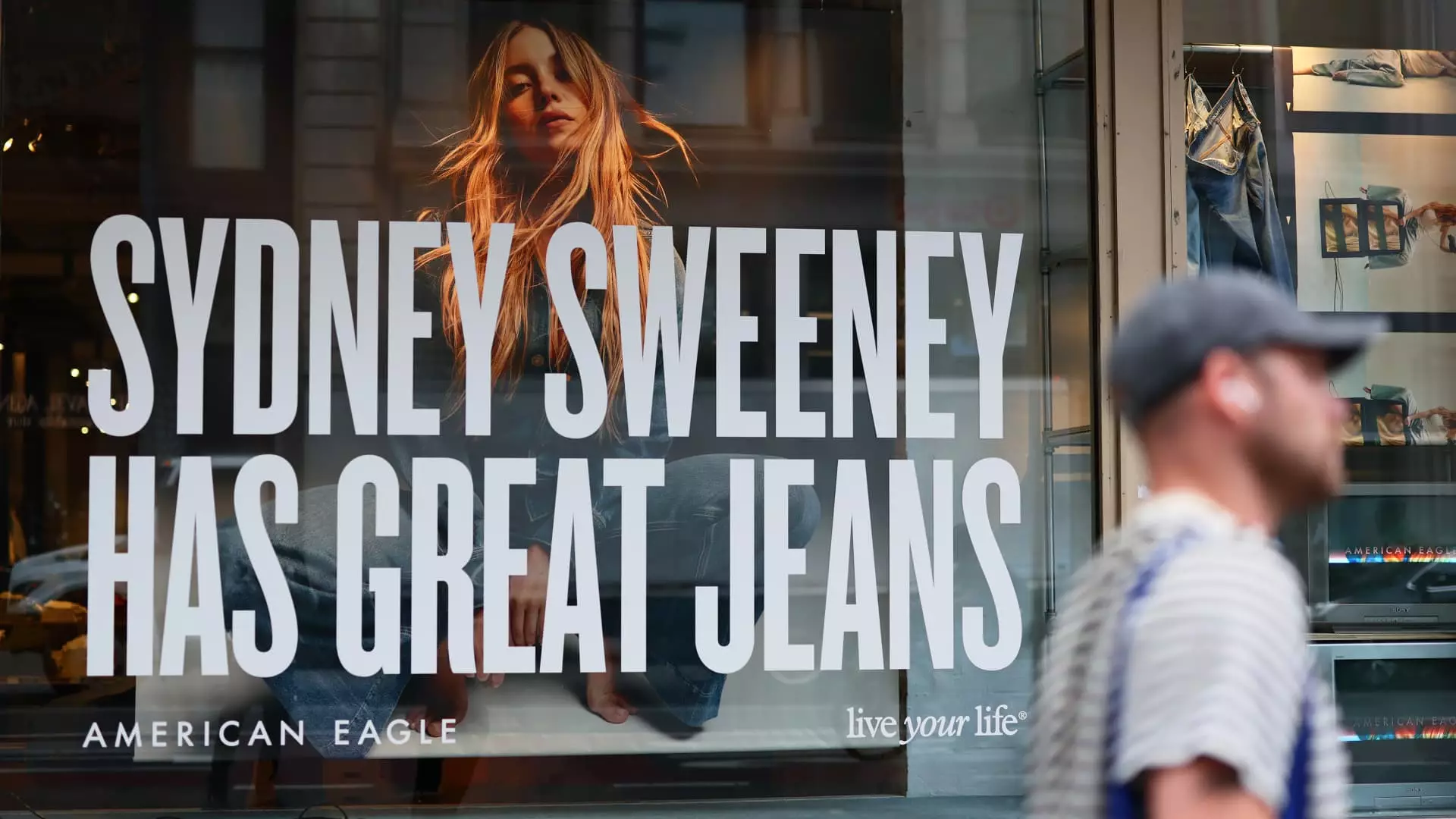American Eagle’s recent marketing push with actress Sydney Sweeney represents far more than just another casual campaign; it exemplifies the delicate balancing act brands must perform amid a polarized cultural landscape. The decision to spotlight Sweeney, framed by slogans such as “Sydney Sweeney has great jeans,” was a calculated move to appeal to a conservative-leaning demographic that appreciates straightforward messaging. Yet, the campaign ignited debate over whether this approach is truly courageous or simply playing it safe in a climate rife with hyper-sensitivity. Is American Eagle daring to challenge woke standards by leaning into traditional values, or are they merely slipping into the comfort zone of cultural conservatism that arguably offers a safer bet with fewer controversies?
American Eagle’s choice to highlight Sweeney—a celebrity with known conservative inclinations—appears to be more strategic than accidental. In an era where brands are often accused of pandering to political correctness or “wokeness,” choosing a candidate who is publicly identified with certain traditional values can be seen as a calculated gamble to solidify trust among their core customer base. It’s an assertion that, despite the woke cultural wave, there is still value in recognizing and celebrating conservative standards in marketing. Essentially, American Eagle’s campaign is a subtle shot across the bow, signaling that it’s possible to engage consumers with edgier, less woke content while maintaining mass appeal.
This approach diverges sharply from the recent fallout experienced by companies like Bud Light, which faced fierce backlash after collaborations perceived as “woke” went awry. American Eagle’s decision to not overly complicate its messaging with social activism can be interpreted as a strategic move toward centrist positioning—balancing traditional appeal with modern branding efforts. It’s a reminder that in the shifting sands of cultural zeitgeists, brands that pigeonhole themselves as either excessively woke or overly conservative risk alienating large segments of their audience. American Eagle’s campaign dances along this fine line, daring to toe the edge without tipping into the ideological void.
Market Reactions and Cultural Implications
The stock market’s reaction to the campaign confirms that American Eagle’s strategy is polarizing but potentially lucrative. When the social media giant Truth Social echoed Donald Trump’s praise for the campaign—calling out Sweeney’s “hotness” and the jeans’ popularity—shares shot up by 20%, signaling investor confidence in the brand’s boldness. This surge underscores an important reality: in a culture starved for authenticity and straightforward messaging, brands that align with conservative or traditional values often find eager audiences and enthusiastic market responses.
However, this rebound comes following a period of turbulence for American Eagle. The retailer’s recent struggles to maintain sales momentum, coupled with macroeconomic uncertainties such as tariffs and market volatility, have forced the company to rethink its branding strategy. Despite the short-term boost from the campaign, the broader financial trajectory remains complex. Sales are down, and inventory writedowns signal ongoing challenges. Yet, the renewed interest in American Eagle, reflected by a surge in search interest, hints at a latent demand among consumers who seek brands that feel less threatened by the ideological extremes of contemporary culture.
Certainly, American Eagle’s approach raises some critical questions about the future of corporate marketing. Should companies avoid mainstream political or cultural issues altogether? Or is there value in boldly asserting one’s ideological stance in order to differentiate from the competition? This case exemplifies that striking the right tone is vital. Lean too far into woke marketing, and the brand risks alienating traditional customers; ignore the cultural climate altogether, and the brand risks becoming invisible amidst a sea of sameness. American Eagle’s gamble appears to favor positioning itself as a relatable, authentic alternative—something that could resonate with a significant segment of American consumers tired of virtue signaling from other brands.
The Cultural War and the Shrinking Middle Ground
What American Eagle’s campaign reveals is a broader cultural shift—a narrowing middle ground that once allowed brands to be politically neutral or vague without consequence. Today, consumers increasingly demand authenticity and ideological alignment from brands, whether they hail from the left or right. For the moderate conservative or center-right demographic, the question is whether American Eagle’s strategy truly strikes a chord, or merely capitalizes on current trends without depth.
This political and cultural dogfight raises the stakes for corporate marketing strategies. The risk is that by aligning too overtly with traditional values, companies could alienate younger consumers who gravitate toward more progressive messaging. Conversely, opting for “woke” campaigns risks backlash in traditionally conservative markets. American Eagle’s nuanced stance suggests that the middle ground—firmly rooted in traditional American ideals—may be a lucrative, underexploited space. It’s a reminder that brands which understand the complex fabric of societal values—without pandering excessively—can carve out a successful niche.
In this landscape, authenticity becomes the currency of success. American Eagle isn’t merely selling jeans; it’s staking a claim in a cultural battlefield where values and identity drive consumer loyalty. Whether this strategy pays off in long-term sales remains uncertain, but what’s clear is the shifting expectations of consumers who no longer accept bland, ideology-free advertising. They want brands to stand for something—whether traditional or progressive—and American Eagle’s campaign exemplifies a bold attempt to do just that from a center-right perspective.
In this age of chaos, the ability of companies to navigate the cultural minefield with tact and authenticity will determine who survives—and who becomes relics of a bygone era.

